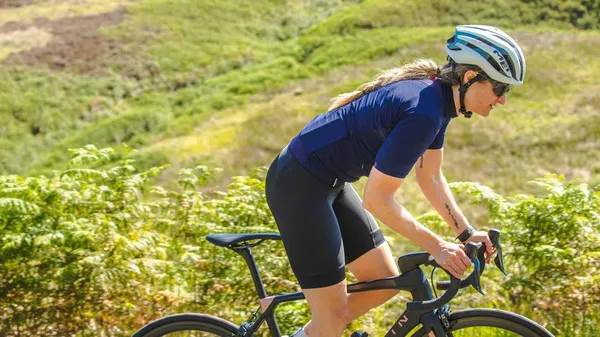Cycling is not just a sport; it’s a way of life for many. Whether you’re a casual rider or a competitive cyclist, the gear you wear can significantly affect your experience. One of the most popular pieces of cycling apparel is the bib short. But why do cyclists choose bibs over traditional shorts? This article explores the comfort, performance benefits, and other reasons why bibs have become a staple in cycling attire.
What Are Bib Shorts?
Bib shorts are a type of cycling shorts that feature shoulder straps. Unlike traditional shorts, which rely on an elastic waistband, bibs use straps that go over the shoulders. This design helps keep the shorts in place and provides a snug fit around the waist.
Components of Bib Shorts
Material: Bib shorts are usually made from a blend of polyester and spandex. This combination provides flexibility and durability.
Chamois Padding: The chamois is the padding inside the shorts. It offers cushioning and reduces friction between the rider and the bike seat.
Silicone Grippers: Many bibs have silicone grippers at the leg openings. These keep the shorts from riding up during rides.
Mesh Panels: Some bibs include mesh panels for breathability. This feature is particularly helpful during long rides in warm weather.
SEE ALSO: What is Swift Cycling?
Comfort: A Key Factor
No Waistband Digging
One of the most immediate benefits of bib shorts is the absence of a waistband. Traditional cycling shorts can dig into your skin, especially during long rides. Bibs distribute pressure evenly across the shoulders and back, eliminating the discomfort caused by tight waistbands.
Enhanced Fit
Bib shorts provide a superior fit compared to regular cycling shorts. The shoulder straps hold the shorts in place, ensuring they don’t slide down or bunch up. This snug fit allows for more freedom of movement, making it easier to pedal without restriction.
Chamois Quality
The chamois padding in bibs is often designed for long-distance comfort. Higher-quality bibs use multi-density foam that contours to your body, providing support where you need it most. This padding reduces the risk of saddle sores and discomfort during extended rides.
Temperature Regulation
The material used in bib shorts often includes moisture-wicking properties. This means they can draw sweat away from your body, keeping you dry and comfortable. In cooler weather, the thermal properties of some bibs can provide additional warmth.
Performance Benefits
Aerodynamics
The streamlined design of bib shorts can enhance aerodynamics. Because they fit snugly against the body, they reduce wind resistance. This can be particularly beneficial for competitive cyclists looking to shave seconds off their time.
Better Muscle Support
The compressive nature of bib shorts helps support the muscles during rides. This compression can improve blood circulation, reducing fatigue. As a result, cyclists may feel less tired and recover more quickly after intense rides.
Reduced Chafing
The design of bibs minimizes seams and reduces the risk of chafing. Fewer seams mean fewer friction points, which is crucial for long rides. Chafing can be painful and distracting, but bib shorts help mitigate this issue.
Less Movement Restriction
The shoulder straps in bib shorts keep them securely in place, allowing for unrestricted movement. This feature is especially important when climbing or sprinting. Riders can focus on their performance without worrying about their shorts shifting.
Other Advantages of Bib Shorts
Style and Aesthetics
Many cyclists prefer the look of bib shorts. They often come in a variety of designs and colors, allowing riders to express their style. Some brands offer custom designs, making it easy for teams to coordinate their appearance.
Convenience in Nature Breaks
While it may seem counterintuitive, bib shorts can be more convenient for quick nature breaks. Because there’s no waistband, you can pull them down without having to remove everything. This can save time during long rides.
Versatility
Bibs can be worn for various cycling disciplines, including road cycling, mountain biking, and gravel riding. Their versatility makes them a go-to choice for many cyclists.
Choosing the Right Bib Shorts
When selecting bib shorts, consider the following factors:
Fit and Sizing
Make sure to try on different sizes and styles. A good fit is crucial for comfort and performance. Pay attention to how the straps feel and whether the shorts stay in place.
Padding
The chamois comes in different thicknesses and shapes. Choose one that matches your riding style and duration. For long rides, opt for thicker padding, while shorter rides may require less.
Material Quality
Invest in high-quality materials. Look for bibs with moisture-wicking properties and good breathability. This will enhance your comfort during rides.
Price Point
Bibs come in a wide range of prices. While it might be tempting to go for cheaper options, investing in a higher-quality pair can make a significant difference in comfort and performance.
Maintenance of Bib Shorts
Washing and Care
To prolong the life of your bib shorts, wash them carefully. Use cold water and avoid fabric softeners, as they can damage the material. Hang them to dry instead of using a dryer.
Storage
Store your bib shorts in a cool, dry place. Avoid folding them tightly, as this can cause creases that may affect their fit.
Conclusion
Cyclists wear bib shorts for several compelling reasons. The comfort they provide, thanks to the absence of a waistband and the quality of the chamois, is unmatched. Performance benefits, including improved aerodynamics and muscle support, make them a top choice for serious riders.
Whether you’re embarking on a long-distance ride or simply enjoying a leisurely outing, investing in a good pair of bib shorts can enhance your cycling experience. With their combination of style, comfort, and functionality, it’s no wonder that bibs have become a staple in cycling gear. So, if you haven’t tried them yet, consider giving bib shorts a chance on your next ride!
Related topics:
- What Is a Good FTP for Cycling?
- What Cleats Do Pro Cyclists Use?
- What Type of Cycling Shoes for Peloton?

